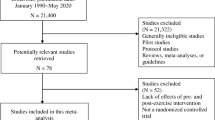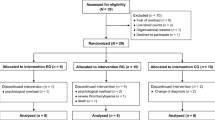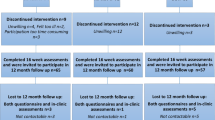Abstract
Purpose
Cancer and its treatment-related side effects induce loss of physical performance. This study evaluated the effects of multimodal aerobic and strength exercises on physical performance in hospitalized cancer patients while receiving myeloablative chemotherapy.
Methods
In this prospective pilot study, 48 evaluable patients were randomly assigned to a training (TG, n = 24) or control (CG, n = 24) group. The TG performed an individually supervised exercise program five times a week with ergometer training and strength exercises for 20 min each during the hospitalization period for chemotherapy. The CG received standard physiotherapy. Physical performance was evaluated using spiroergometry, lung function, and muscle strength testing. Treatment-related side effects were assessed by daily interviews, quality of life by EORTC-QLQ-C30, and fatigue using the Modified Fatigue Impact Scale (MFIS) questionnaire.
Results
Physical performance significantly increased in the TG (8.96 ± 24 W) and decreased in the CG (−7.24 ± 20 W, p = 0.02). At 2-mmol/ml blood lactate concentration, the TG achieved significantly increased oxygen consumption (p = 0.03) and expiratory minute ventilation (p = 0.04) compared to the CG. Furthermore, physical functioning increased significantly in the TG (p = 0.04). Patients in the TG required less antiemetics (p = 0.01) and experienced significantly less fatigue (p = 0.04), although MFIS analysis was not able to detect this beneficial effect. Patients of the CG displayed higher impairments of cognitive (p = 0.02) and psychosocial function (p = 0.03) after chemotherapy. No adverse events due to the study intervention were observed.
Conclusions
Multimodal exercise has beneficial effects on physical performance, physical functioning, and treatment-related symptoms even during myeloablative chemotherapy. We suggest an enhanced physical activity intervention program during hospitalization of cancer patients.
Similar content being viewed by others
References
Bellizzi KM, Rowland JH, Arora NK, Hamilton AS, Miller MF, Aziz NM (2009) Physical activity and quality of life in adult survivors of non-Hodgkin's lymphoma. J Clin Oncol 27:960–966
Courneya KS, Mackey JR, Bell GJ, Jones LW, Field CJ, Fairey AS (2003) Randomized controlled trial of exercise training in postmenopausal breast cancer survivors: cardiopulmonary and quality of life outcomes. J Clin Oncol 21:1660–1668
De Backer IC, Vreugdenhil G, Nijziel MR, Kester AD, van Breda E, Schep G (2008) Long-term follow-up after cancer rehabilitation using high-intensity resistance training: persistent improvement of physical performance and quality of life. Br J Cancer 99:30–36
Mustian KM, Sprod LK, Palesh OG, Peppone LJ, Janelsins MC, Mohile SG, Carroll J (2009) Exercise for the management of side effects and quality of life among cancer survivors. Curr Sports Med Rep 8:325–330
Speck RM, Courneya KS, Mâsse LC, Duval S, Schmitz KH (2010) An update of controlled physical activity trials in cancer survivors: a systematic review and meta-analysis. J Cancer Surviv 4:87–100
Elter T, Stipanov M, Heuser E, von Bergwelt-Baildon M, Bloch W, Hallek M, Baumann F (2009) Is physical exercise possible in patients with critical cytopenia undergoing intensive chemotherapy for acute leukaemia or aggressive lymphoma? Int J Hematol 90:199–204
Adamsen L, Quist M, Midtgaard J, Andersen C, Møller T, Knutsen L, Tveterås A, Rorth M (2006) The effect of a multidimensional exercise intervention on physical capacity, well-being and quality of life in cancer patients undergoing chemotherapy. Support Care Cancer 14:116–127
Adamsen L, Quist M, Andersen C, Møller T, Herrstedt J, Kronborg D, Baadsgaard MT, Vistisen K, Midtgaard J, Christiansen B, Stage M, Kronborg MT, Rørth M (2009) Effect of a multimodal high intensity exercise intervention in cancer patients undergoing chemotherapy: randomised controlled trial. BMJ 339:b3410
Conn VS, Hafdahl AR, Porock DC, McDaniel R, Nielsen PJ (2006) A meta-analysis of exercise interventions among people treated for cancer. Support Care Cancer 14:699–712
Daley AJ, Crank H, Saxton JM, Mutrie N, Coleman R, Roalfe A (2007) Randomized trial of exercise therapy in women treated for breast cancer. J Clin Oncol 25:1713–1721
Knols R, Aaronson NK, Uebelhardt D, Fransen J, Aufdemkampe G (2005) Physical exercise in cancer patients during and after medical treatment: a systematic review of randomized and controlled trials. J Clin Oncol 23:3830–3842
Dimeo FC, Fetscher S, Lange W, Mertelsmann R, Keul J (1997) Effects of aerobic exercise on the physical performance and incidence of treatment-related complications after high-dose chemotherapy. Blood 90:3390–3394
Dimeo FC, Stieglitz RD, Novelli-Fischer U, Fetscher S, Keul J (1999) Effects of physical activity on the fatigue and psychologic status of cancer patients during chemotherapy. Cancer 85:2273–2277
Dimeo FC (2001) Effects of exercise on cancer-related fatigue. Cancer 92:1689–1693
Dimeo FC, Schwartz S, Fietz T, Wanjura T, Böning D, Thiel E (2003) Effects of endurance training on the physical performance of patients with hematological malignancies during chemotherapy. Support Care Cancer 11:623–628
Griffith K, Wenzel J, Shang J, Thompson C, Stewart K, Mock V (2009) Impact of a walking intervention on cardiorespiratory fitness, self-reported physical function, and pain in patients undergoing treatment for solid tumors. Cancer 115:4874–4884
Courneya KS, Sellar CM, Stevinson C, McNeely ML, Peddle CJ, Friedenreich CM, Tankel K, Basi S, Chua N, Mazurek A, Reiman T (2009) Randomized controlled trial of the effects of aerobic exercise on physical functioning and quality of life in lymphoma patients. J Clin Oncol 27:4605–4612
Courneya KS, Segal RJ, Mackey JR, Gelmon K, Reid RD, Friedenreich CM, Ladha AB, Proulx C, Vallance JK, Lane K, Yasui Y, McKenzie DC (2007) Effects of aerobic and resistance exercise in breast cancer patients receiving adjuvant chemotherapy: a multicenter randomized controlled trial. J Clin Oncol 25:4396–4404
Jacobsen PB, Phillips KM, Jim HS, Small BJ, Faul LA, Meade CD, Thompson L, Williams CC Jr, Loftus LS, Fishman M, Wilson RW (2013) Effects of self-directed stress management training and home-based exercise on quality of life in cancer patients receiving chemotherapy: a randomized controlled trial. Psychooncology 22(6):1229–1235
Dimeo F, Schmittel A, Fietz T, Schwartz S, Köhler P, Böning D, Thiel E (2004) Physical performance, depression, immune status and fatigue in patients with hematological malignancies after treatment. Ann Oncol 15:1237–1242
Larsen J, Nordstrom G, Ljungman P, Gardulf A (2004) Symptom occurrence, symptom intensity, and symptom distress in patients undergoing high-dose chemotherapy with stem-cell transplantation. Cancer Nurs 27:55–64
Morishita S, Kaida K, Yamauchi S, Wakasugi T, Yoshihara S, Taniguchi K, Ishii S, Ikegame K, Kodama N, Ogawa H, Domen K (2013) Gender differences in health-related quality of life, physical function and psychological status among patients in the early phase following allogeneic haematopoietic stem cell transplantation. Psychooncology 22(5):1159–1166
Mosher CE, Redd WH, Rini CM, Burkhalter JE, DuHamel KN (2009) Physical, psychological, and social sequelae following hematopoietic stem cell transplantation: a review of the literature. Psychooncology 18:113–127
Carlson LE, Smith D, Russell J, Fibich C, Whittaker T (2006) Individualized exercise program for the treatment of severe fatigue in patients after allogeneic hematopoietic stem-cell transplant: a pilot study. Bone Marrow Transplant 37:945–954
Dimeo F, Bertz H, Finke J, Fetscher S, Mertelsmann R, Keul J (1996) An aerobic exercise program for patients with haematological malignancies after bone marrow transplantation. Bone Marrow Transplant 18:1157–1160
Dimeo F, Schwartz S, Wesel N, Voigt A, Thiel E (2008) Effects of an endurance and resistance exercise program on persistent cancer-related fatigue after treatment. Ann Oncol 19:1495–1499
Baumann FT, Kraut L, Schule K, Bloch W, Fauser AA (2010) A controlled randomized study examining the effects of exercise therapy on patients undergoing haematopoietic stem cell transplantation. Bone Marrow Transplant 45:355–362
Baumann FT, Zopf EM, Nykamp E, Kraut L, Schüle K, Elter T, Fauser AA, Bloch W (2011) Physical activity for patients undergoing allogeneic hematopoietic stem cell transplantation: benefits of a moderate exercise intervention. Eur J Haematol 87:148–156
Jarden M, Baadsgaard MT, Hovgaard DJ, Boesen E, Adamsen L (2009) A randomized trial on the effect of a multimodal intervention on physical capacity, functional performance and quality of life in adult patients undergoing allogeneic SCT. Bone Marrow Transplant 43:725–737
Jarden M, Nelausen K, Hovgaard D, Boesen E, Adamsen L (2009) The effect of a multimodal intervention on treatment-related symptoms in patients undergoing hematopoietic stem cell transplantation: a randomized controlled trial. J Pain Symptom Manag 38:174–190
Kim SD, Kim HS (2005) Effects of a relaxation breathing exercise on anxiety, depression, and leukocyte in hemopoietic stem cell transplantation patients. Cancer Nurs 28:79–83
Mello M, Tanaka C, Dulley F (2003) Effects of an exercise program on muscle performance in patients undergoing allogeneic bone marrow transplantation. Bone Marrow Transplant 32:723–728
Wiskemann J, Dreger P, Schwerdtfeger R, Bondong A, Huber G, Kleindienst N, Ulrich CM, Bohus M (2011) Effects of a partly self-administered exercise program before, during, and after allogeneic stem cell transplantation. Blood 117:2604–13
Borg G (1998) Borg’s perceived exertion and pain scales. Human Kinetics, Champaign
Aaronson NK, Ahmedzai S, Bergman B, Bullinger M, Cull A, Duez NJ, Filiberti A, Flechtner H, Fleishman SB, de Haes JC et al (1993) The European Organization for Research and Treatment of Cancer QLQ-C30: a quality-of-life instrument for use in international clinical trials in oncology. J Natl Cancer Inst 85:365–376
Fisk JD, Ritvo PG, Ross L, Haase DA, Marrie TJ, Schlech WF (1994) Measuring the functional impact of fatigue: initial validation of the fatigue impact scale. Clin Infect Dis 18:S79–S83
Acknowledgments
The study was sponsored by the “Hamburger Krebsgesellschaft”.
Conflict of interest
We do not have any conflicts of interests. We have full control of all primary data and would allow the journal to review the data if requested.
Author information
Authors and Affiliations
Corresponding author
Rights and permissions
About this article
Cite this article
Oechsle, K., Aslan, Z., Suesse, Y. et al. Multimodal exercise training during myeloablative chemotherapy: a prospective randomized pilot trial. Support Care Cancer 22, 63–69 (2014). https://doi.org/10.1007/s00520-013-1927-z
Received:
Accepted:
Published:
Issue Date:
DOI: https://doi.org/10.1007/s00520-013-1927-z




